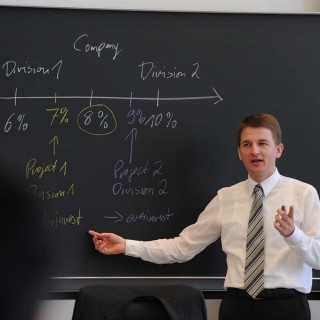
Knowledge, information and comms system management
Follow Knowledge, information and comms system managementFind out more about ESMT's experts research in the field of knowledge, information and comms system management.
ESMT European School of Management and Technology
- Mar 16, 2015 LATEST EPISODE
- infrequent NEW EPISODES
- 1h 36m AVG DURATION
- 3 EPISODES
More podcasts from ESMT European School of Management and Technology
Latest episodes from Knowledge, information and comms system management

Video: Panel Discussion "Cybersecurity: How to respond to growing threats"
Governments, companies, schools, or critical infrastructures are facing an increasingly challenging cybersecurity environment. Melissa Hathaway, former acting senior director for cyberspace at the National Security Council of the United States, has purported the theory it may not be that we are simply not making enough progress; we may actually be moving backwards. At the ESMT panel discussion “Cybersecurity: How to respond to growing threats”, Melissa Hathaway will outline how technology, practice, policy, and law must be changed and used to assure cybersecurity. Subsequently she will discuss her points of action with Lars Klingbeil and Sandro Gaycken. What minimum standards must be introduced and enforced for devices in a network? Is a solution to be found by focusing on critical services, not critical infrastructures? Which incentives should be introduced to support rapid market adoption of more secure technology? Who should be made accountable?

Marking the German release of his book “The Internet is not the Answer”, bestselling author Andrew Keen was at ESMT European School of Management and Technology in Berlin. The Internet has now ushered in one of the greatest shifts in society since the Industrial Revolution. In his book, Andrew Keen describes the Internet as a mirror of our culture and investigates how it is reconfiguring our world, often at great cost. He presented his main theses and debated his ideas with Norbert Riedel, Commissioner for International Cyber Policy of the German Federal Foreign Office, and Sandro Gaycken, cybersecurity expert at ESMT. The panel discussion was moderated by Christoph von Marschall, Chief Diplomatic Correspondent, Verlag Der Tagesspiegel.

This paper shows that privacy concerns in commercial contexts are not solely driven by a desire to control the transmission of personal information or to avoid intrusive direct marketing campaigns. When they express privacy concerns, consumers anticipate indirect economic consequences of data use, such as price discrimination. Our general hypothesis is that consumers are capable of expressing differentiated levels of concerns in the presence of changes that suggest indirect consequences of information transmission. We suggest that there is a homo economicus behind privacy concerns, not simply a primal fear. This hypothesis is tested in a large-scale experiment evoking the context of affinity-based direct marketing of insurances, which relies on data transmitted by alumni associations. Because opt-in and opt-out choices offered by firms to consumers usually capture non-situational preferences about data transmission, their ability to enact privacy concerns is questioned by our findings.

















